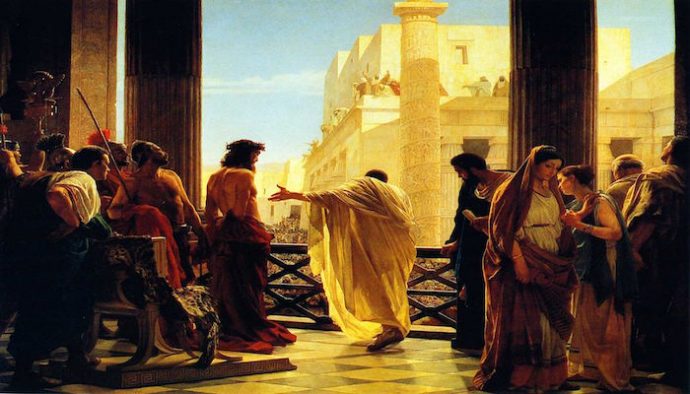Pilate thought he had a way out. It would be perfect – a way to satisfy the crowd and at the same time remind the impudent Sanhedrin just who was in charge. They thought they had backed him into a corner, bringing this clearly innocent man to be tried in order to be executed. But now he had them.
He would put it to a choice to the crowd. When Jesus of Nazareth stood next to a convicted criminal and Pilate promised to release one of them, they would obviously choose Jesus of Nazareth. The crowd would be satisfied and the Jewish leaders reminded of their true standing. Case closed.
But that’s when everything went sideways. As the choice between the two men was put to the crowd, the murmurs started softly at first, but then steadily grew into a near roar. And the crowd quickly turned into a mob as their shouts rang out: “Give us Barabbas! Crucify Jesus!”
So goes this part of the last hours of Jesus, as the guilty go free and the innocent is punished. But there’s more here. There’s more around this prisoner named Barabbas, and the more centers around the change that happened in the crowd over the course of seven days.
Let’s not forget that only days before this same crowd was ready to crown Jesus as their king. They were the ones that welcomed Him to Jerusalem by laying palm branches at His feet. Why were they so enthusiastically now against Jesus, and so enthusiastically now for this man named Barabbas, who was a convicted criminal?
If we dig a little further, we will see an even more vivid picture of the scandal of the gospel presented here.
When we read our text earlier, we see once again that Barabbas was a well-known prisoner, but doesn’t tell us anything of his crime. But the accounts in Mark and Luke tell us that he was arrested for insurrection. Luke further tells us that this insurrection took place in Jerusalem. The text in Mark is very explicit in that it identifies Barabbas as “one of the revels in prison, who had committed murder in the insurrection.”
Now we don’t know exactly what this insurrection was, but we do know that other historians of the time provide evidence of the presence of numerous roving bands of social brigands. These people were popular with peasants – they had sort of a Robin Hood quality to them. They would cause trouble for the Roman oppressors, under the idea that they were political revolutionaries.
So this man Barabbas wasn’t just a common criminal; he was a participant, and a violent one at that, in some kind of political rebellion against the Romans.
And then there’s this detail – some translations of Matthew give this criminal’s full name as Jesus Barabbas.
So now the reaction of the crowd is becoming a bit more clear, isn’t it? This is the crowd that hailed the entrance of Jesus, but they hailed him as their version of the Messiah. And their version of the Messiah was a political king – someone who would, probably through violence, lead an uprising and overthrow the Roman oppression. These people who laid down their palm branches weren’t looking for a suffering Savior – they were looking for a conquering revolutionary. And over the course of the past week, they had come to see that Jesus of Nazareth was not who they were looking for.
Pilate stands before the crowd. Can you see it? On the one hand, he has Jesus of Nazareth. The one who advocated for loving your enemies. For going the extra mile. Who rejected time and time again the people’s attempts to forcibly make Him king. The one who befriended the outcasts and the sinners, the very people that this same crowd despised and disdained. And on the other hand, he has Jesus Barabbas. The revolutionary. The man of action. The one bent on taking down the political system.
And now can you hear the question a little differently? For here Pilate says, “Which Jesus do you want?”
That is a penetrating question for us this Easter season, for the same question might well be asked of us. Which Jesus do you want? Do you want the Jesus who meets all your expectations and fashions His ways to your liking, or do you want the true Jesus? The one that time and time again will confront you with the truth, even if you don’t want to hear us?
Which Jesus? Which will we crucify and which will we worship? For we can’t have it both ways.
Subscribe to MichaelKelley.co
Never miss a new post. Subscribe to receive these posts in your inbox and to receive information about new discipleship resources.





1 Comment